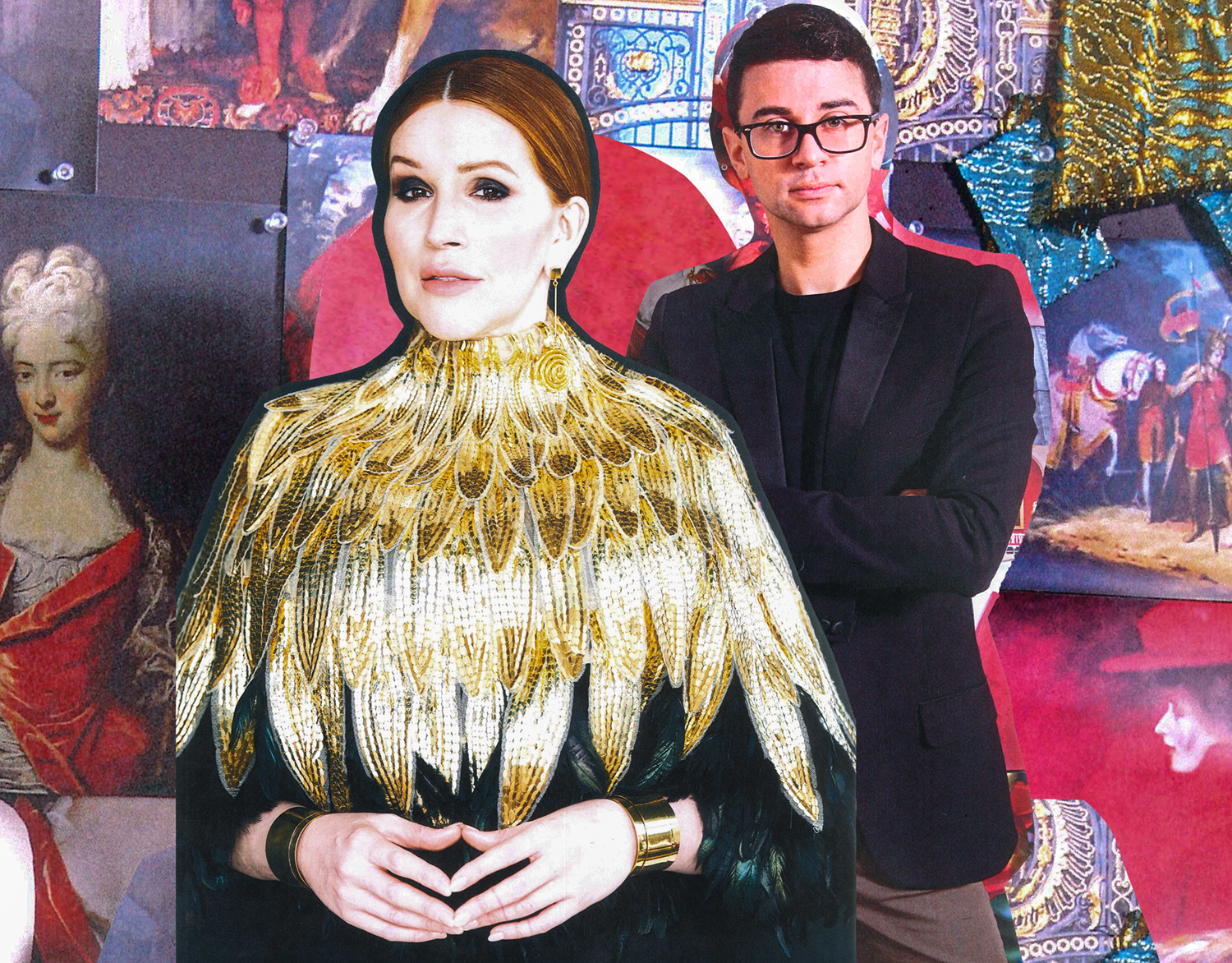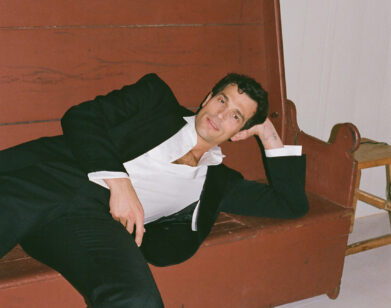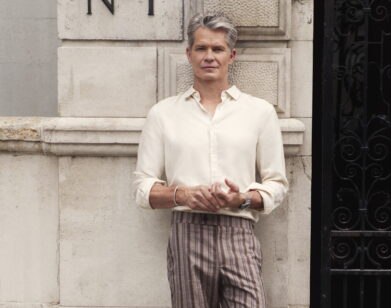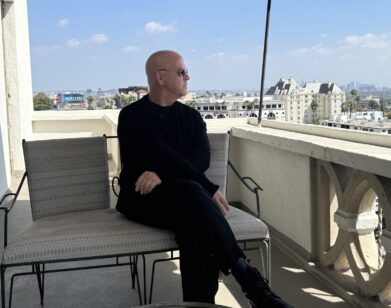Our Lady J and Christian Siriano Talk Glamour, Pain, and Pose

Art by Jack Vhay.
“Pose,” as a verb, is the act of assuming a particular attitude or position in order to be photographed, painted, or drawn. Pose, as a show, is a story about triumph, defeat, glamour, sadness, and—perhaps most importantly—substantial, comprehensive, and accurate LGBTQ+ representation. The series created by Ryan Murphy, Brad Falchuk, and Steven Canals, which just premiered its highly-anticipated second season on FX, is unlike any other drama on television. Although that’s a big claim, Pose has the receipts to back it up. For starters, the show proudly boasts the largest trans cast ever for a TV show, which includes Indya Moore, Dominique Jackson, and MJ Rodriguez. The inclusion of trans talent extends behind the camera as well, with trans activists and icons like Janet Mock writing, directing, and producing episodes for the series. It is clear that Pose is here to serve—not only lewks, but also healing, understanding, and education. “I learned that writing to the truth of our collective pain can inspire empathy, which is the path towards connection and healing,” says Pose writer Lady J, who is also the first ever trans woman to perform at Carnegie Hall, a former writer on Transparent, and a vocal HIV and AIDS advocate. In honor of Pride month and the return of Pose, Lady J opened up to her friend Christian Siriano, who designed the look she wore to the Critics Choice Awards (as well as radically inventive gowns for other cast members like Billy Porter.) Lady J discussed how she uses her musical skills to hone her writing, teaching the children about trans rights, and her beloved “doggies.” The category is: live, work, Pose! – ERNEST MACIAS
———
CHRISTIAN SIRIANO: I’ve seen you out and about recently at various events, including the GLAAD Awards. Congratulations on all the recognition you’ve received from Pose. How does it feel to be a part of such a groundbreaking show?
OUR LADY J: Thank you! It’s been humbling to be a part of something that’s not only entertaining, but important to so many people. While writing on Transparent, I saw just how many folks had been starving for accurate reflections of their lives in the media, but these attempts had been blocked by prejudices within the industry for so long. I think we owe the current wave of trans representation to the generations of activists who worked tirelessly to break down these prejudices, and I feel so lucky to be living in a time where this newfound freedom allows me to write authentic characters and truly queer storylines.
SIRIANO: How did you get involved with POSE?
LADY J: Ryan had known my work from Transparent, so he contacted my agent and set up a meeting. When he explained his vision for the show, I was immediately hooked. I was already a fan of both Ryan’s work and Paris Is Burning, so I didn’t need much convincing to come on a show that combined both of those things. He said there were going to be trans folks working both on camera and behind the scenes, and that FX was going to pull out all the stops. A lot of people in this industry say things like “this is going to be big,” but nothing ever comes of it. When Ryan Murphy says it’s going to be big, you know it’s going to happen.
SIRIANO: What can we expect from season two?
LADY J: Besides more fashion, more music, and more bitchy drama from all your favorite characters, we’re going to be leaning into the realities of what it was like to be living with HIV/AIDS in the middle of the plague. I don’t think younger generations understand just how much HIV/AIDS had an effect on our world and on modern activism, so we’re creating both a history lesson and a memoriam to everyone who has been affected by the disease. Even though medicine has improved life expectancy and stopped the transmission of HIV (if taken properly), the stigmas our characters faced in 1990 still exist today. It’s my hope that revisiting that period of time with a birds-eye view will help us put an end to that stigma.
SIRIANO: What motivates me as a designer is to create change and break stereotypes. How do you think you’ve achieved this through your work?
LADY J: When I started out as a musician, I was more focused on creating fantasy and escape, but when I transitioned to writing, I realized there was a real need for work about identity and community. I shifted my work to answer the question, “Where can I make positive change happen?” and everything changed. I learned that writing to the truth of our collective pain can inspire empathy, which is the path towards connection and healing.
SIRIANO: You’ve been very open about your personal journey. What did you learn through this process and how much of it did you draw upon when writing for the show?
LADY J: When you’re connecting with your characters and writing something that’s emotional and heavy, it’s impossible for things in your life not to come up during the process. As someone living with HIV, I think I realized just how much anti-HIV prejudice I had normalized in order to get through day-to-day life. I thought I had less fight in me, accepting a certain level of social ostracization because of my status, but this season, these characters have taught me that I still have a lot of fight left in me.
SIRIANO: You have such an interesting personal story. How has that nurtured you as an artist?
LADY J: I grew up on a farm in a village of two hundred people, and now I work as a producer and writer in Hollywood, so if my journey has taught me anything, it’s that life is long and unpredictable. Anything is possible, and that’s really all the inspiration I need to stay creative.
SIRIANO: What was a pivotal moment in your childhood that made you realize that perhaps your path was different?
LADY J: I was given the choice to either shovel cow manure or practice the piano—I chose the piano. [Laughs] I never really noticed I was that different until other kids told me. I think that being bullied made me introverted, which eventually led to a creative path.
SIRIANO: What keeps you grounded?
LADY J: My little doggies! And breath work, music, and prayer.
SIRIANO: How has the music world influenced you as a writer? Do you have to get into a different creative headspace when it comes to writing for film and television?
LADY J: Sitting in front of the piano for seven hours a day trained me for the solitude of writing. Also, working in a writers room is kind of like playing in an orchestra — you learn when it’s time to listen, and when it’s time to speak up.
SIRIANO: It’s been wonderful to see you in some of my creations on the red carpet. Tell me about your style evolution and what fashion means to you.
LADY J: Oh my goddess, there is no feeling like seeing yourself in a Christian Siriano! I never feel constrained when I’m wearing your designs, which is the most important thing I look for in fashion right now. I used to enjoy the feeling of being pulled and cinched, but the idea of being contorted into someone else’s idea of what my body should be just feels belittling and not where I want to be with my life. I’m at a pretty great place in accepting that my body is perfect in all of its forms, simply because it’s alive and healthy. I want fashion to accentuate that, not cover it up or deny it.
SIRIANO: What’s next on your agenda?
LADY J: Stress less, love more—that’s my real agenda. I’m doing the writer thing, pitching and writing, but I can’t say too much except that I’m excited for the future. One of these projects is a play I’m developing with Michael Arden directing. It’s juicy and gay and honest and devastating—basically, everything I want to see on Broadway.






